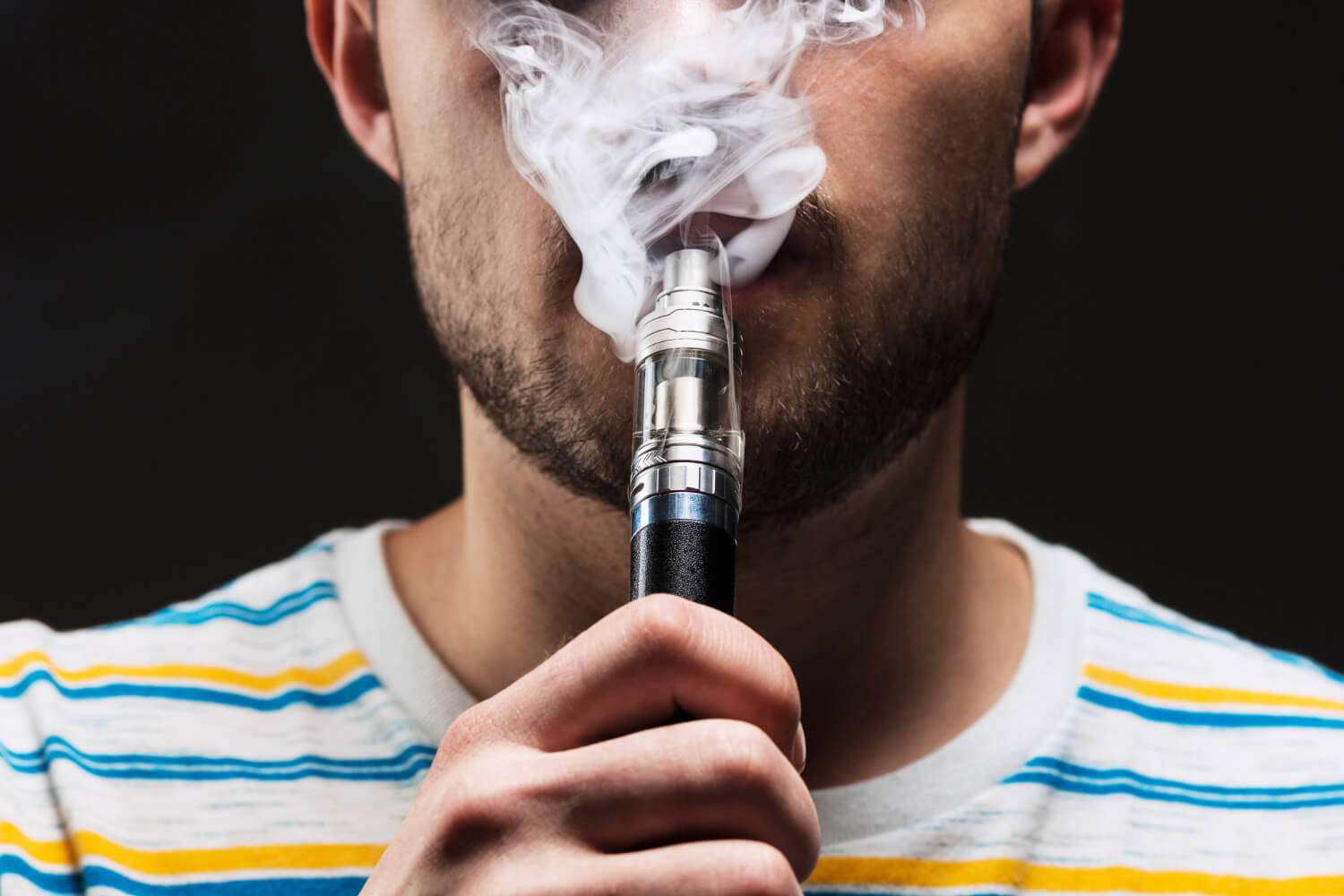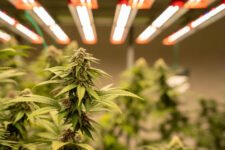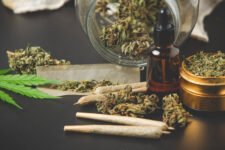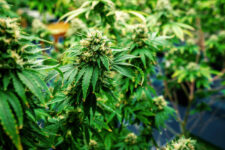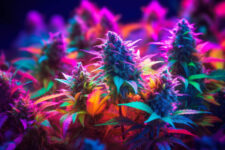The important properties that Delta-8 has for anyone who uses it are indeed very useful for everyone. However, the most important question is – Is Delta-8 legal? Is it considered to be something that should be openly sold in the markets of the USA? Well, as it turns out, we are about to find that soon!
Reminder: What is Delta-8 THC?
For all those people who might be wondering what Delta-8 is, do you remember THC or Tetrahydrocannabinol? Yes, that was indeed the ‘active’ or ‘potent’ part of Cannabis.
THC is responsible for imparting nearly all the important properties to Cannabis and its variants, whenever it is used.
However, there is something else that makes THC that potent and active. This psychoactive substance is called ‘Delta-8 THC’. Just like THC, it is found to occur in very minute or scanty quantities in Cannabis plants.
Because of its ‘rare occurrence’, Delta-8 is often seen to be synthesized in the laboratory synthetically alongside other Cannabis products that are also rare.
The Federal Stance on Delta-8 THC
It should already be evident by now that the current status or standing of Delta-8 in the national and international markets is still controversial.
There are several reasons why the entire family of Cannabis, THC, and Delta-8 is considered to be controversial and illegal in some parts of the world.
Apart from the popular claims that people can easily misuse it because of its getting ‘high’ potential, there are also some other reasons that make it stand on controversial ground even today.
Here is an overview of the Federal Stance revolving around Delta-8 in the USA.
Controlled Substances Act
Under the federal Controlled Substances Act (CSA), Delta-8 THC is considered a Schedule I controlled substance, just like Delta-9 THC, which is the primary psychoactive compound in cannabis. This classification implies that it is illegal at the federal level.
Hemp-Derived Delta-8
The 2018 Farm Bill legalized hemp and its derivatives, such as CBD (cannabidiol), as long as they contain less than 0.3% Delta-9 THC on a dry weight basis.
However, this Farm Bill did not explicitly address Delta-8 THC, creating a legal gray area. Some argued that Delta-8 THC derived from hemp was legal under the Farm Bill, while others contended that it was not.
DEA’s Interim Final Rule
In August 2020, the Drug Enforcement Administration (DEA) issued an Interim Final Rule that suggested any synthetically derived THC, including Delta-8 THC, was considered a Schedule I controlled substance.
This rule seemed to suggest that even if Delta-8 THC was derived from hemp, it would still be illegal at the federal level.
Delta-8: State-by-State Regulations
Since the USA is a very large parameter to be judged for its choices, rules, and legislations, it is best if all the legal matters are viewed from a state-by-state perspective.
This helps in assessing the situation from a broader and clear perspective. It also helps in judging where the irises started, and what could be possibly done to end controversies or arguments on logical grounds.
It is a well-known fact that the legal status of Delta-8 THC has always varied from state to state in the United States.
To summarize things from a better perspective, here’s a general overview of Delta-8 THC regulations by state as of the year 2021.
Legal or Unregulated States
Some states had no specific laws or regulations addressing Delta-8 THC, making it more accessible.
These states included Alabama, Arizona, Arkansas, Delaware, Idaho, Iowa, Mississippi, Montana, Nebraska, Nevada, and Utah.
In these states, it thus becomes very easy for the people to buy their requested products and use them to their full liberty.
States with Delta-8 THC Bans
Several states explicitly banned or restricted Delta-8 THC, either by categorizing it as a controlled substance or by implementing regulations that effectively prohibited its sale.
These states included Alaska, Colorado, Kentucky, Michigan, North Dakota, Oregon, Rhode Island, Vermont, and Washington.
States with Specific Regulations
Some states allowed Delta-8 THC but imposed specific regulations. For example, in California and Illinois, Delta-8 THC products needed to be derived from licensed cannabis sources.
Similarly, in Florida, Delta-8 THC was legal for medical use. In Texas, Delta-8 THC was permitted, but there were age restrictions and labeling requirements.
States with Pending Legislation
In some states, the legal status of Delta-8 THC was still under discussion, and legislation was pending to clarify its status. This included states like Georgia and Wisconsin.
However, laws are always bound to change. Therefore, it’s essential to check the most recent regulations in your state to get the most up-to-date information, and know where Delta-8 THC stands today.
With the ongoing changes and updates in the research taking place on Cannabis, THC, and Delta-8 THC, it won’t be surprising if it actually gets legalized in the USA entirely.
Safety Concerns and Controversies
Since the bans and restrictions put over Delta-8 THC have already been reviewed, it is only fair if the safety concerns and the apparent controversies revolving around Delta-8 THC are reviewed as well.
So, here is a general overview regarding the various concerns and controversies put over Delta-8 THC.
Lack of Regulation
One of the primary concerns is the lack of consistent regulation. Delta-8 THC is often produced from hemp-derived CBD through a chemical process that converts CBD into Delta-8 THC.
The legality and safety of this process can vary by state and are subject to changing regulations. This lack of oversight can lead to inconsistencies in product quality and safety.
Purity and Contaminants
The production of Delta-8 THC can result in impurities and contaminants if not done properly. Some Delta-8 THC products may contain residual solvents or other harmful substances. Consumers risk exposure to these contaminants when using unregulated products.
Psychological Effects
Delta-8 THC is psychoactive, and its effects can vary from person to person. Some users report feeling anxious, paranoid, or overly sedated after consuming Delta-8 THC. These psychological effects can be unpredictable, making it challenging for users to control their experience.
Tolerance and Dependency
Like Delta-9 THC, Delta-8 THC has the potential for tolerance and dependency. Regular use can lead to increased tolerance, requiring higher doses to achieve the desired effects. Some users may develop a dependency on Delta-8 THC, leading to withdrawal symptoms when they try to quit.
Youth Access
There are concerns about youth access to Delta-8 THC products. These products often come in attractive forms like gummies or vapes, making them appealing to younger individuals.
The Future of Delta-8 THC Regulation
If seen today, the status of Delta-8 THC seems very controversial and doubtful. However, will the same exist in the years to come? Well, this is a question that nobody can honestly answer.
There are several factors revolving around its legality and controversial status. But, the debate about the future of Delta-8 THC could be viewed from here.
Increased Federal Oversight
One possible future scenario is that the federal government might take a more active role in regulating Delta-8 THC.
This could involve the implementation of clearer rules and guidelines regarding its production, sale, and labeling. Increased federal oversight may help address some of the safety concerns associated with Delta-8 THC.
Changes in Hemp Legislation
Any changes to federal laws related to hemp could impact the legality of Delta-8 THC. The legal status of Delta-8 THC often hinges on how it is derived from hemp.
If there are updates to the legal definition of hemp or its derivatives, it could affect the availability and regulation of Delta-8 THC products.
State-Level Regulations
Many states were already taking steps to regulate Delta-8 THC as of 2021. The future could see more states implementing specific regulations, including restrictions on potency, product labeling, and licensing requirements for manufacturers and retailers.
FAQs
Why is Delta-8 THC legal in some states but not others?
Delta-8 THC’s legality varies because it is subject to state-level cannabis regulations. Some states explicitly permit it, while others classify it as a controlled substance due to differing interpretations of federal laws and regulations. Sometates allow its usage for specific purposes, whereas in other states, it is considered to be a completely ‘forbidden’ substance.
Are there any safety concerns associated with Delta-8 THC?
Yes, safety concerns associated with Delta-8 THC include potential impurities in unregulated products, unpredictable psychological effects, tolerance and dependency risks, and interactions with medications or health conditions.
It is somewhat due to these concerns and controversies that the authorities are not fully accepting the role of Delta-8 THC as a safe product.
How does the federal government view Delta-8 THC?
The Federal government views Delta-8 THC as a controlled substance, specifically a Schedule I substance, under the Controlled Substances Act.
However, its legality remains a subject of debate and can vary depending on interpretations of existing laws and regulations. It is safe to say or assume that the Federal Government has mixed views regarding the status of Cannabis, THC, and Delta-8 THC.
What might the future hold for Delta-8 THC regulations?
The future of Delta-8 THC regulations may involve increased federal oversight, changes in hemp legislation, state-level regulations, quality control measures, consumer education, and continued market evolution to adapt to changing legal requirements and consumer demands.
If everything proceeds smoothly,then it could also be expected that Delta-8 THC could enjoy a fully-legalized status and be used by people for its beneficial purposes openly.

